外研版八年级英语上Moduel1.How to learn English Unit 1 第2课时
外研版八年级英语上册单词表

外研版八年级英语上册单词表Module 1 How to learn English1、pair [pεə] n.(相关的)两个人,一对。
2、correct [kə'rekt] vt. 改正;纠正。
adj. 正确的;对的;3、spelling ['speliŋ]n. 拼写;拼字4、word [wə:d] n. 单词;字;词5、practise ['præktis] vi. 练习,6、match [mætʃ] v t. 找到与…..相配之物,使成对;使相配7、meaning ['mi:niŋ]n. 意义;意思8、complete [kəm'pli:t] v.把….填完整;使完全。
9、sentence ['sentəns] n. 句子10、dictionary ['dikʃənəri] n. 字典;词典11、grammar ['ɡræmə] n. 语法12、letter ['letə] n. 信;字母13、look up 查,查找14、mistake [mi'steik] n. 错误;过错15、make a mistake 犯错误16、understand [,ʌndə'stænd] v.(understood [,ʌndə'stud])理解;明白17、advice [əd'vais] n. 建议;意见19、possible ['pɔsəbl] adj. 可能的20、write down 写下;记下21、notebook ['nəutbuk] n. 笔记本22、forget [fə'get] v. (forgot [fə'ɡɔt])忘,忘记23、pronounce [prəu'nauns] v. 发……..的音24、aloud [ə'laud] adv. 大声地;出声地25、radio ['reidiəu] n.电台,广播26、pronunciation [prəu,nʌnsi'eiʃən] n. 发音27、key [ki:] adj. 关键行动,非常重要的28、main [mein] adj.主要的,最大的29、excellent ['eksələnt] adj. 极好的;极好的30、agree [ə'ɡri:] vt.同意;赞同31、agree with sb. 同意某人32、vocabulary [vəu'kæbjuləri] n. 词汇;词汇量33、ask for请求(给予)34、improve [im'pru:v] vt. 改善,改进35、basic ['beisik] adj. 主要的;基础的36、time [taim] n. 回;次37、advise [əd'vaiz] vt.向…..提出意见;建议;忠告38、shy [ʃai] adj. 害羞的;腼腆的39、conversation [,kɔnvə'seiʃən] n. 交谈;谈话40、quickly ['kwikli] adv. 迅速地;快地41、natural ['nætʃərəl] adj. 合理的;合乎常情的42、suggest [sə'dʒest] vt. 提议,建议43、place [pleis] vt. 放置Module 2 My home town and my country1、hill [hil] n. 小山;小丘2、population [,pɔpju'leiʃən] n.(某一地区)人口,全体居民3、wide [waid] adj. 宽的,宽阔的4、million ['miljən] num.百万5、pretty ['priti] adv. 相当地,非常,很6、pretty good 相当好,很好7、than [ðæn, 弱ðən] prep. 比9、north [nɔ:θ] n. 北,北方;adj. 北方的;朝北的10、south [sauθ, sauð] n. 南方,南;adj. 朝南的,在南方的11、west [west] n.西;西方adj. 在西方的;朝西的12、home town 故乡;家乡13、especially [i'speʃəli] adv. 特别;尤其14、be famous for因…..而闻名15、university [,ju:ni'və:səti] n.大学16、island ['ailənd] n. 岛;岛屿17、area ['εəriə] n.区域,地区18、low [ləu] adj. 低的,矮的19、mountain [`mauntin] n. 山;山岳20、countryside ['kʌntri,said] n. 农村地区,乡下;21、umbrella [ʌm'brelə] n. 雨伞Module 3 Sports xK b1.C om1、baseball ['beisbɔ:l] n.棒球3、boring ['bɔ:riŋ] adj. 无聊的;烦人的4、exciting [ik'saitiŋ] adj.使人兴奋的;令人激动的5、relaxing [ri'læksiŋ] adj. 令人愉悦的;使人轻松的6、score [skɔ:] vi.(体育比赛中)得分;记分7、already [ɔ:l'redi] adv. 已经,早已8、matter ['mætə] n.问题;麻烦9、What`s the matter 怎么了?10、hurt [hə:t] vt. 使受伤;使疼痛11、enjoyable [in'dʒɔiəbl] adj. 有乐趣的;令人愉快的12、Olympics [əu'limpiks] n. 奥林匹克运动会13、stadium ['steidiəm] n. 体育场14、miss [mis] v. 未击中;未达到17、plenty of 大量;众多18、beat [bi:t] vi. 战胜;打败19、careless ['kεəlis] adj. 粗心的;疏忽的20、cheer…on 用欢呼声激励;为….加油21、coach [kəutʃ] n. 教练22、fan club球迷(或影迷、歌迷)俱乐部23、against [ə'ɡenst] prep. (在比赛或战斗中)对(某人或某事物)24、train [trein] v. (体育)训练;操练25、practice ['præktis] n. 练习26、warm [wɔ:m] vt. 使暖和;使…温暖27、warm up 热身;做准备活动28、usual ['ju:ʒuəl] adj. 通常的,平常的29、better [betə] adv. 更好地;adj. 更好的30、after-school ['æftəskʊl] adj. 下午放学后的,课外的31、pleased [pli:zd] adj. 开心的;满足的33、pity ['piti] n.可惜;遗憾34、chance [tʃɑ:ns] n. 机会,可能性35、loudly ['laudli] adv. 大声地,响亮地36、confident ['kɔnfidənt] adj.自信的Module 4 Planes, ships and trains X| k |B| 1 . c |O |m1、road [rəud] n. (尤指)公路,路2、accident ['æksidənt] n. 交通事故;意外事件3、except [ik'sept] prep. 除…之外4、choice [tʃɔis] n. 选择5、classmate ['klɑ:smeit] n. 同班同学6、far [fɑ:] adv. 远;遥远地;adj. 远的;遥远的7、far from 远离8、close [kləuz] adj.(距离上)近点,接近的。
外研版八年级上英语《Module1HowtolearnEnglish》说课稿

外研版八年级上英语《 Module 1 How to learn English》说课稿一. 教材分析外研版八年级上英语《Module 1 How to learn English》是本模块的第一单元,主要围绕学习英语的方法和技巧展开。
本单元包括三个部分:课文阅读、语法讲解和综合练习。
课文阅读部分通过一篇关于李华和Tom谈论学习英语方法的文章,让学生了解不同的学习方法和策略。
语法讲解部分主要介绍了一般现在时态的用法。
综合练习部分则通过各种练习题,巩固学生对课文内容和语法知识的理解。
二. 学情分析八年级的学生已经具备了一定的英语基础,能够听、说、读、写一些简单的英语句子。
但他们在学习过程中,可能还存在一些问题,如学习方法不当、学习习惯不好等。
因此,教师在教学过程中要注重引导学生掌握正确的学习方法和策略,培养良好的学习习惯。
三. 说教学目标1.知识目标:让学生掌握一般现在时态的用法,了解不同的学习方法和策略。
2.能力目标:培养学生运用英语进行交流的能力,提高学生的阅读理解能力。
3.情感目标:激发学生学习英语的兴趣,培养他们积极向上的学习态度。
四. 说教学重难点1.重点:一般现在时态的用法,不同学习方法和策略的掌握。
2.难点:一般现在时态的用法,以及如何运用所学知识进行实际交流。
五. 说教学方法与手段1.教学方法:采用任务型教学法,让学生在完成任务的过程中,自然地学习和运用英语。
2.教学手段:利用多媒体课件、图片、实物等辅助教学,提高学生的学习兴趣和参与度。
六. 说教学过程1.导入:通过一首英文歌曲,引出本课主题,激发学生的学习兴趣。
2.呈现:展示课文图片,引导学生回答相关问题,引入课文主题。
3.阅读:让学生阅读课文,回答问题,理解课文内容。
4.讲解:讲解一般现在时态的用法,让学生通过例句理解并掌握。
5.练习:让学生进行语法练习,巩固对一般现在时态的掌握。
6.交流:分组讨论,让学生分享自己的学习方法和策略,互相学习。
八年级英语上册 Module 1 How to learn English全模块教案 外研版

Module 1 How to learn English (5 periods)模块教材分析本模块以“How to learn English”为话题,以学习征求建议、提出建议的方法为主线,介绍了单词分类记忆、根据上下文判断词义、听力细节辨认、反向推理、略读等学习方法。
通过模块学习,除了能掌握上述英语学习方法之外,还可根据老师和同学的建议制定更适合自己的学习计划;同时,模块也综合复习了初一所学的一般现在时、现在进行时、一般将来时和一般过去时的用法。
课型设计与课时分配Period 1 Vocabulary and Listening (U1 Ac. 1--4)Period 2 Pronunciation andSpeaking (U1 Ac. 5—6 & WB)Period 3 Reading and Vocabulary (U2 Ac.1--4)Period 4 Writing and Language practice (U2 Ac.5—6 & U3 Ac. 1--6) Period 5 Around the wo rld and Module Task (U3 Ac.7—13 & WB)M1--Period 1: Vocabulary and listening课型:听说课执笔:徐艳姣学习内容 M 1 Unit 1 Try not to translate every word. (Activities 1--4)学习目标 1. 掌握给别人提出建议(关于H ow to learn English)的方法。
2. 能给表示学习活动的词汇分类,掌握单词分类记忆法。
3. 能听懂对话主题,能进行听力细节辨认,完成填表、答问等任务。
4. 复习巩固一般现在时、现在进行时、一般过去时和一般将来时的用法。
学习重点A . Key vocabulary 重点词汇translate, translation, correct, grammar, pronunciation, spelling, term, advice,write down, mistake, else, message, each, each other, excellentB.Key structures 重点句式1. How about …?2. Why don’t you …?3. You should …4. But try(not) to …5.What else?6. It’s a good idea to check your vocabulary notebook everyday.学习难点 1. translate, advice, write down, else的用法。
新版外研版英语八年级上册Module_1__How__to__learn_English_Unit_1课件
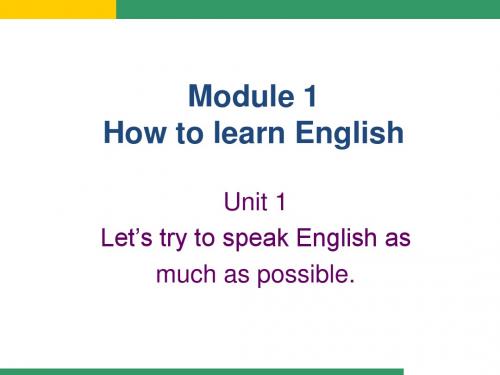
4.Underline the correct words and expressions
Here is my (1)advice / notebook on Learning English .Speak English (2)always / as much as possible in class ,and listen to English (3)in the newspaper/ on the radio .I (4)agree / forget it is a good idea to look up new words in the (5)notebook /dictionary .You can find the (6)correct /excellent pronunciation and learn the meaingb.
4.make a mistake / mistakes • mistake 意为“错误”。 例:我们在说英语时都会犯错。 We all will make mistakes when we speak English.
• 【拓展】by mistake 错误地,无意地。 例:Sorry, I took your pen by mistake.
1.Today, we are going to talk about good ways to learn English. • talk about sb / sth 意为“讨论,谈论” 【译一译】 Jim and Tom are talking about how to learn English. Do you know some good ways to learn English ?
/'pɒsəbl / /'nəʊt,bʊk /
(完整版)英语外研版八上短语句型归纳,推荐文档
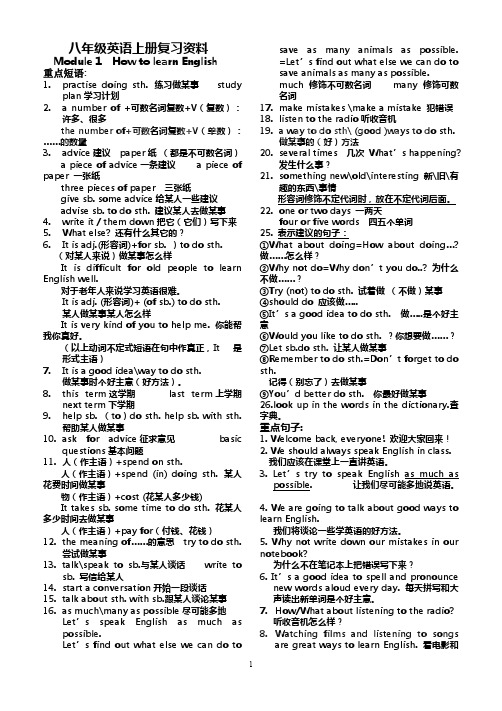
八年级英语上册复习资料Module 1 How to learn English重点短语:1.practise doing sth. 练习做某事studyplan学习计划2. a number of +可数名词复数+V(复数):许多、很多the number of+可数名词复数+V(单数):……的数量3.advice建议paper纸(都是不可数名词)a piece of advice一条建议 a piece of paper 一张纸three pieces of paper 三张纸give sb. some advice给某人一些建议advise sb. to do sth. 建议某人去做某事4.write it / them down把它(它们)写下来5.What else? 还有什么其它的?6.It is adj.(形容词)+for sb. )to do sth. (对某人来说)做某事怎么样It is difficult for old people to learn English well.对于老年人来说学习英语很难。
It is adj. (形容词)+ (of sb.) to do sth.某人做某事某人怎么样It is very kind of you to help me. 你能帮我你真好。
(以上动词不定式短语在句中作真正,It 是形式主语)7.It is a good idea\way to do sth.做某事时个好主意(好方法)。
8.this term这学期last term上学期next term下学期9.help sb. (to)do sth. help sb. with sth.帮助某人做某事10.ask for advice征求意见basicquestions基本问题11.人(作主语)+spend on sth.人(作主语)+spend (in) doing sth. 某人花费时间做某事物(作主语)+cost (花某人多少钱)It takes sb. some time to do sth. 花某人多少时间去做某事人(作主语)+pay for(付钱、花钱)12.the meaning of……的意思try to do sth.尝试做某事13.talk\speak to sb.与某人谈话write tosb. 写信给某人14.start a conversation开始一段谈话15.talk about sth. with sb.跟某人谈论某事16.as much\many as possible尽可能多地Let’s speak English as much as possible.Let’s find out what else we can do tosave as many animals as possible.=Let’s find out what else we can do tosave animals as many as possible.much 修饰不可数名词many 修饰可数名词17.make mistakes \make a mistake 犯错误18.listen to the radio听收音机19.a way to do sth\ (good )ways to do sth.做某事的(好)方法20.several times 几次What’s happening?发生什么事?21.something new\old\interesting 新\旧\有趣的东西\事情形容词修饰不定代词时,放在不定代词后面。
2022秋外研版八年级英语上册 点拨 Module 1-6 模块知识点归纳
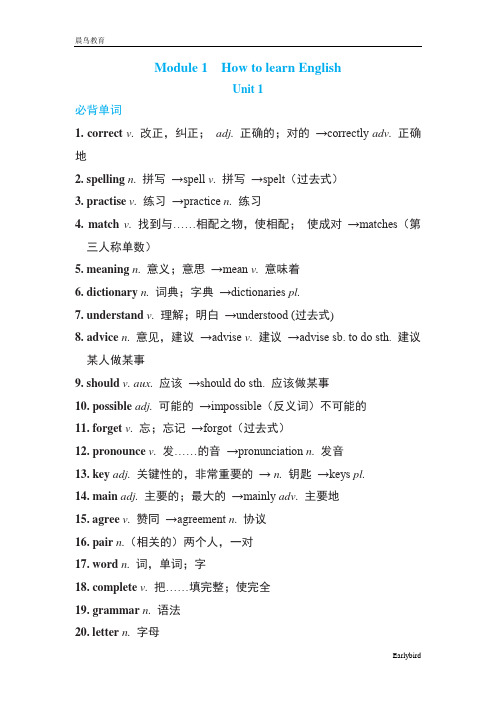
Module 1 How to learn EnglishUnit 1必背单词1. correct v. 改正,纠正;adj.正确的;对的→correctly adv. 正确地2. spelling n. 拼写→spell v. 拼写→spelt(过去式)3. practise v. 练习→practice n. 练习4. match v. 找到与……相配之物,使相配;使成对→matches(第三人称单数)5. meaning n. 意义;意思→mean v. 意味着6. dictionary n. 词典;字典→dictionaries pl.7. understand v. 理解;明白→understood (过去式)8. advice n. 意见,建议→advise v. 建议→advise sb. to do sth. 建议某人做某事9. should v. aux. 应该→should do sth. 应该做某事10. possible adj.可能的→impossible(反义词)不可能的11. forget v. 忘;忘记→forgot(过去式)12. pronounce v. 发……的音→pronunciation n. 发音13. key adj.关键性的,非常重要的→ n. 钥匙→keys pl.14. main adj.主要的;最大的→mainly adv. 主要地15. agree v. 赞同→agreement n. 协议16. pair n.(相关的)两个人,一对17. word n. 词,单词;字18. complete v. 把……填完整;使完全19. grammar n. 语法20. letter n. 字母21. aloud adv. 大声地;出声地22. excellent adj.极好的;优秀的必背短语23. look up 查;查找24. make a mistake 犯错误25. agree with sb. 同意某人26. get to do sth. 逐渐做某事必背句子27. Let’s try to speak English as much as possible. 让我们尽可能多地说英语。
外研版八年级上第一模块短语

Module 1 How to learn English1. look up查;查找(代词放在中间)in pairs 成对地2. make a mistake 犯错误;by mistake 错误地3. talk about谈论;讨论4. speak + 语言“讲某种语言”5. write down写下;记下(代词放中间)6. next to在……旁边;紧挨着7. listen to the radio听广播8. be good for对……有好处9. write to给……写信10. a little有点(后面加不可数名词)11.agree with sb.同意某人,agree to do sth 同意做某事12. talk to/ with 跟……交谈13. send sth to sb = send sb sth把……(发)送给某人14. ask for请求(给予) 15. watch films看电影16. be from来自= come from17. smile at 冲……微笑18. go to bed去睡觉19. through/ by reading 通过阅读,why not = why don’t you +动词原形20. think about考虑,思考21. make friends with sb.与某人交朋友,English-speaking people 说英语的人们22. take sb. around带领某人参观…23. a few几个;一些(后面加可数名词复数)24. invite sb. to邀请某人到……,invite sb to do sth 邀请某人做某事25. be good at擅长=do well in (接名词、代词和动名词) 26. for example例如,chat with sb 和某人聊天27 advice(1)n.意思是“意见,建议”,为不可数名词,可用some,much,a piece of,pieces of等修饰,不能说an advice或many/a few advices。
外研版英语八年级上册Module-1单元知识点归纳总结(详细版)

Module1 How to learn EnglishUnit1 Let’s try to speak English as much as possible.1.Welcome back!Welcome back to school!Welcome to China/our school/my home town! Welcome home!You’re welcome.give sb. a cold/warm welcome*注意welcome的词性v. adj n.2.talk with/to sb. about sth.have a talk/conversation with sb.3. ask for some advicea piece of advice注意advice是不可数名词,不能说these advicegive sb. advice给某人建议take/follow one’s advice听从某人的建议;4. speak English in classspeak English as much as possibleread books as many as you canas…as possible = as…as one can/could 5. write down our mistakes in our notebooks write it/them down (代词宾格只能放中间)类似结构还有pick up, take off, put on, turn on, turn off, turn down, turn up6. forget/ remember to do sth.记得、忘记要做某事(还没做)·forget/remember doing sth. 记得、忘记做过某事(已经做了)eg: Don’t forget to bring your photos here when you come.I remember seeing him somewhere in Jiaxing. 我记得在嘉兴的某个地方见过他。
2016-2017学年外研社初中八年级英语上册Module-1-How-to-learn-English.精品教案

2016-2017学年外研社初中八年级英语上册Module 1 How to learn EnglishUnit 1 Let’s try to speak English as much as possible.一、学习目标:A.单词和短语:pair, correct, spelling, word, practice, match, meaning, complete, sentence, dictionary, grammar, letter, look up, mistake, make a mistake, understand-understood, advice, should, possible, write down, notebook, forget-forgot, pronounce, aloud, radio, pronunciation, key, main, excellent, agree, agree with sb., vocabulary, ask for, improve, basic, time, advise, shy, conversation, quickly, natural, suggest, placeB.交际用语:1. Ready?2. That’s a good idea.3. What else?4. Thanks a lot!5. Excellent!6. We should always speak English in class.7. Let’s try to speak English as much as possible.8. Why not write down the mistakes in our notebooks?9. It’s a good idea to spell and pronounce new words aloud.10. How about listening to the radio?11. It’s better not to translate.12. It’s a good idea to check new words every day.二. 教学目标1. Function: Giving suggestions (English study)2. Structu re: Giving advice: 1) We/You should…2) Let’s try to…3) Why not…?4) It’s a good idea to…5) How about…?6) Why don’t we/you…?7) It’s better not to…3. Skills: 1) Listening and understanding familiar topics (English study).2) Talking about problems in English study and giving advice, conductingconversations in several turns.3) Reading and finding specific information about English study.4) Drafting a letter asking for advice about English study, revising throughpair discussion..4. Around the world: English online5. Task: Writing your English study plan.三、重点及难点:Giving advice: 1) We/You should…2)Let’s try to…3) Why not…? 4) It’s a good idea to…5) How about…? 6) Why don’t we/you…? 7) It’s better not to…四、教学设计:Unit 1 Let’s try to speak English as much as possible.ⅠTeaching modelListening and speakingⅡTeaching methodPWP approachⅢTeaching aims1. To understand conversations involving advice on learning English.2. To get information about how to learn English from the conversation.3. To understand the way of giving advice.4. To practise giving advice on English learning.ⅣTeaching Objectives1. Key vocabulary: pair, correct, spelling, word, practice, match, meaning, complete,sentence, dictionary, grammar, letter, look up, mistake, make amistake, understand-understood, advice, should, possible, writedown, notebook, forget-forgot, pronounce, aloud, radio, key, main,excellent, agree, agree with sb., vocabulary2. Key structures: 1) We/You should…2) Let’s try to…3) Why not…? 4) It’s a good idea to…5) How about…? 6) Why don’t we/you…? 7) It’s better not to…ⅤTeaching aidsTape recorder, OHP , videoⅥTeaching StepsStep 1 Warming up1. Show some pictures of school things. Say how to learn English well.2. Read the words after the teacher.3. Introduce the new words.4. Learn the new words.Step 2 Read and check.1. Read the instructions in Activity 1and check(√) the ones you understand.1) Work in pairs. Ask and answer the questions.2) Correct the spelling.3) Listen and check the words you hear.4) Practise saying the words.5) Match the words with the meaning.6) Complete the sentences with the words in the box.3. Ask the students to check their answer with a partner.4. Call back the answer from the whole class and check the answer.Step 3 Listen and repeat.1. Ask the students to read the word and expressions in Activity2.dictionary grammar letter look up make a mistake meaning understand 2. Read through the questions.1) Which word did Daming not understand?2) What mistake did Lingling make?3) How does Daming usually check the spelling of a word?4) Why is it difficult for Daming to check the spelling of cinema?3. Play the recording and ask the students to listen to the recording carefully.4. Listen and answer the questions. Use the words and expressions from the box.5. Play the recording again, then they can check their answer with a partner.6. Call back the answer from the whole class and check the answer.Step 4 Listen and read.1. Show some pictures, and ask the students to talk about them.2. Ask the students to read the conversation silently.3. Play the recording and ask the students to listen and read the conversation.4. Read the conversation.5. Act it out.6. Learn ―Everyday English‖Ready?That’s a good idea.What else?Thanks a lot!Excellent!7. Tell the students how to learn English well.1) We should always speak English in class.2) Let’s try to speak English as much as possible.3) Why not write down the mistakes in our notebooks?4) Don’t forget to write down the correct answers next to the mistakes.5) It’s a good idea to spell and pronounce new words aloud every day.6) How about listening to the radio?7) How about reading English stories?8) W hy don’t we try to find some English pen friends?Step 5 Writing.1. Read the conversation again.2. Ask the students to write notes about learning English.Listening : listen to the radioSpeaking : ___________________________________________________ Reading : ____________________________________________________Writing: ____________________________________________________ Learning new words: ___________________________________________3. Ask the students to check with a partner.4. Check the answers:Keys:Listening : listen to the radioSpeaking : speak English as much as possibleReading : read an English storiesWriting: write to pen friends, write down our mistakes in our notebooks, write down the correct answers next to the mistakesLearning new words: spell and pronounce new words aloud every dayStep 6 Underline the correct words and expressions.1. Ask the students to read through the passage in Activity 4.Here’s my (1) advice / notebook about learning English. Speak English (2) always / as much as possible in class, and listen to English (3) in the newspaper / on the radio. I (4) agree / forget it’s a good idea to look up new worlds in the ( 5) notebook / dictionary. You can find the (6) correct / excellent pronunciation and learn the meaning2. Underline the correct words and expressions.3. Check with a partner.4. Call back the answers from the whole class.Keys: 1. advice 2. as much as possible 3. on the radio 4. agree 5. dictionary 6. correct 5. Read the passage together.Step 7 Listen and repeat.1. Play the recording once without stopping.2. Play the recording again and ask the whole class to repeat.1) We should always speak English in class.2) Let’s try to speak English as much as possible.3) Why not write down the mistakes in our notebooks?4) It’s a good idea to spell and pronounce new words aloud.5) How about listening to the radio?3. Ask the students to listen and mark the intonation.4. Now listen again and repeat.Step 8 Work in pairs.1. Talk about problems and give advice.Problems AdviceI can’t… How / What about …?I don’t know… Why not / don’t you …?2. Read through the example with the class.—I can’t speak Engli sh well. What should I do?—Why don’t you try to talk to our classmates in English?3. Work in pairs.Step 9 Important and difficult points1 Why not write down our mistakes in our notebooks?何不在笔记本上把我们的错误记下来?Why not …? 用来表示提出某种建议,而不是询问为什么不做某事的原因,例如:Why not take a walk in the park ?何不在公园里散散步?我们还可以用下面的表达方式来提建议:Why don’t we drive to the country?我们何不开车去乡下?What / How about going to Europe for a holiday?去欧洲度假怎么样?Write down 或者put down 表示―记下,写下‖。
外研社新版八年级上册M1 How to learn English

How many pieces of advice can we find?
• • • • • • • • • • We should do… Let’s try to do… Why not do… Don’t forget to do… It’s a good idea to do… How about doing… You just need to do…. Why don’t we try to do… You’d better do… ….
2. And don‟t forget to write down the correct answers next to the mistakes. What else?
而且不要忘记把正确答案写在所犯错误旁边,还有吗? 1) forget to do sth. 忘记去做某事(某事还没发生) forget doing sth. 忘记做过某事(某事已经发生) e.g.: Don„t forget to post a letter for me . 别忘了帮我邮信。 I forget seeing you somewhere. 我忘记了在什么地方见过你。 类似用法的单词还有“remember”等 remember to do sth./remember doing sth.
白 advice/ədˈva ɪs/ n. 意见,建议 advice 不可数名词 一条建议
a/one piece of advice
两/三条建议 two/three pieces of advice
Pardon? I can’t understand what you are talking about.
Are you kidding me?
Sorry. It is a mistake.
+Module+1+How+to+learn+English知识点清单 外研版八年级英语上册

外研社八年级英语上册Module 1 How to learn English知识点清单课文知识点解析1.practise【词义】v. 练习【用法】后+名词/代词/动词-ing形式【派生词】practice n. 练习【拓展】后接动词-ing形式的其他动词:miss/finish/keep/enjoy/mind/look forward to…【辨析】practise 有规律地练习,特指反复练习;exercise 指训练;锻炼;操练。
2.match【词义】n. 比赛;火柴v. 匹配,搭配【搭配】match…with…把……和……搭配起来3.look up【含义】查,查找【用法】若宾语为代词,放look与up之间;名词放在后面和之间皆可;【拓展】由look构成的其他短语:look at 看look after=take care of 照顾look forward to +sth./ doing sth. 期盼;盼望4.advice【词义】n. 建议【用法】不可数名词some advice 一些建议give advice 提出忠告【辨析】advice 不可数名词suggestions 可数名词【派生词】advise v. 建议5.forget【词义】v. 忘;忘记【常用搭配】forget to do sth 忘记去做某事(事情还未做)forget doing sth 忘记做过某事(事情已做)【拓展】remember v. 记得remember to do sth 记得去做某事(还未做)remember doing sth 记得做过某事(已做)6.suggest【词义】v. 建议;提议【常用搭配】suggest +n. 建议某事suggest doing sth 建议做某事suggest +(that) sb (should) do sth 建议某人应该做某事【派生词】suggestion n. 建议;提议7.write down【含义】写下;记下【用法】后+代词的宾格形式,放在write和down之间;若接名词,放在down前后皆可;8.agree with【含义】赞同;同意【拓展】agree on/about “就……达成一致意见,关于……意见一致”agree to do sth “同意做某事”agree that+从句9.try to do sth 努力做某事try doing sth 尝试做某事try one’s best 尽某人全力try on 试穿try out 试用;试验have a try 试一试10.(1)as …as possible “尽可能……”两as之间用adj./adv.原级【同义结构】as…as one can(2)possible adj. “可能的”【反义词】impossible “不可能的”11. What else? (1)省略疑问句,else根据上文推断其含义;(2)else 放在疑问词和复合不定代词后;(3)辨析else和other:other “其他的”修饰名词,放名词前;12. aloud【词义】adv. 大声地,修饰动词【辨析】aloud adv. 强调发出声音能被听见,常与read,call等词连用;loud adv./adj. 侧重发出的声音大,传得远,修饰speak,laugh等词连用;loudly adv. 有“喧闹,嘈杂”,常与ring,knock等词连用;13. How about…?=What about…?……怎么样?后接名词/代词/动词-ing形式。
外研版八年级上Module1课文带译文

MODULE 1 How to learn English模块1怎样学英语Unit 1Try not to tran slateevery word.第一单元不要试图翻译每个单词。
Ms James:Welcome back,every one! Now, becauseit's a new term, I'm goi ng to give you someadvice. 詹姆士女士:欢迎大家回来。
现在,因为是一个新学期,我打算给你们提一些建议。
Why don't you write itdow n? Ready?把它记录下来好吗?准备好了吗?AII:Yes, Ms James.所有人:是的,詹姆士女士。
Ms James:You shouldalways speak En glish in class.詹姆士女士:你们在课堂上应该一直说英语。
And you should writedow n your mistakes iny our no tebooks.把你们的错误写在你们的笔记本上。
And why don't you writedow n the correctspelli ng and grammar next to the mistakes?What else?为什么不把正确的拼写和语法写在那些错误旁边呢?还有别的什么吗?Lin gli ng:lt's a goodidea to check yourvocabulary no tebookevery day.玲玲:每天检查词汇笔记本是一个好想法。
Ms James:That's a goodidea. Thanks a lot,L in gli ng.詹姆士女士:这是一个好主意。
谢谢你,玲玲。
How about liste ning tothe radio or readi ng an ewspaper in En glish?But try not to tran slateevery word. 听听英语广播节目或者看看英文报纸怎么样?不过不要试图翻译每个单词。
英语(外研版)八年级上册全部课文及翻译

Module 1 How to learn EnglishUnit 1 Let’s try to speak English as much as possible让我们尽可能多地讲英语Welcome back, everyone!同学们,欢迎回来!Today, we’re going to talk about good ways to learn English.今天,我们打算谈论一下学习英语的好方法。
Ready?准备好了吗?Who has some advice?谁有一些建议?We should always speak English in class.在课堂上我们应该总是讲英语。
Good! Let’s try to speak English as much as possible.好!让我们尽可能多地讲英语。
Why not write down the mistakes in our notebooks?为什么不在我们的笔记本上记下错误呢?That’s a good idea. And don’t forget to write down the correct answers next to the mistakes. What else?那是个好主意,而且不要忘记在错误旁边写上正确的答案。
还有其他的什么吗?It’s a good idea to spell and pronounce new words aloud every day.每天大声拼读生词是一个好主意。
Thanks a lot, Lingling. How about listening to the radio?非常感谢你,玲玲。
听广播怎么样?Yes, that’s good for our pronunciation too. But there are so many new words.是的,那也有益于我们的发音。
英语八年级上册重点句型(Module 1 How to learn English)-知识讲义-外研版(三起)
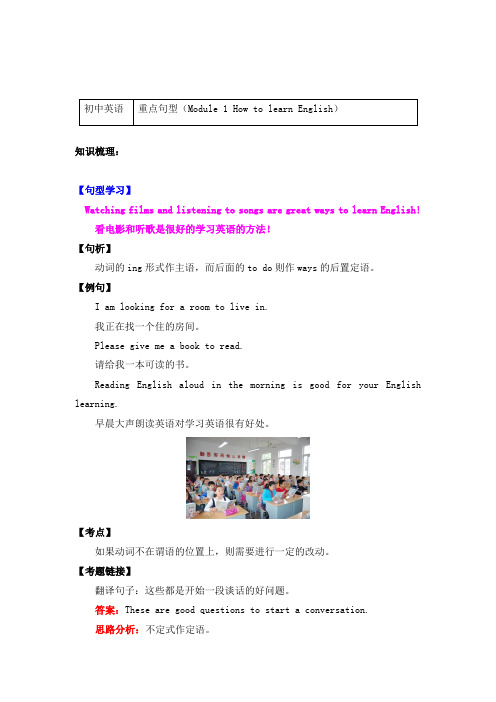
初中英语重点句型(Module 1 How to learn English)知识梳理:【句型学习】Watching films and listening to songs are great ways to learn English!看电影和听歌是很好的学习英语的方法!【句析】动词的ing形式作主语,而后面的to do则作ways的后置定语。
【例句】I am looking for a room to live in.我正在找一个住的房间。
Please give me a book to read.请给我一本可读的书。
Reading English aloud in the morning is good for your English learning.早晨大声朗读英语对学习英语很有好处。
【考点】如果动词不在谓语的位置上,则需要进行一定的改动。
【考题链接】翻译句子:这些都是开始一段谈话的好问题。
答案:These are good questions to start a conversation.思路分析:不定式作定语。
【课文朗读】Questions and answersSend your questions to Diana, the Language Doctor.Many students ask for advice about how to improve their English, Here are three basic questions.The first question is about understanding English films and songs. Li Hao from Hubei wrote, “I like watching English films and listening to English songs, but I don’t understand very much. What can I do?”Watching films and listening to songs are great ways to learn English! Watch and listen several times, and guess the meaning of the new words. Each time you will learn something new. I also advise you to talk about the films or songs with your friends.The second question is about speaking. Wang Fan from Jilin wrote, “Our school has a teacher from the US. I am shy and I am afraid to speak to her. What should I do?”You can say, “Hello! How are you?”“Do you like China?” These are good ways to start a conversation. And before you begin, you should smile at her! Remember this: Do not be shy. Just try.The third question is about vocabulary. Zhang Lei from Anhui wrote, “I write down new words, but I forget them quickly. How can I remember them?”Do not worry. It is natural to forget new words! I suggest you write four or five words a day on pieces of paper and place them in your room. Read the words when you see them, and try to use them.同步练习:(答题时间:15分钟)一、根据汉语完成句子,每空一词。
外研版(新)八年级上册英语各模块知识点归纳总结(完美)
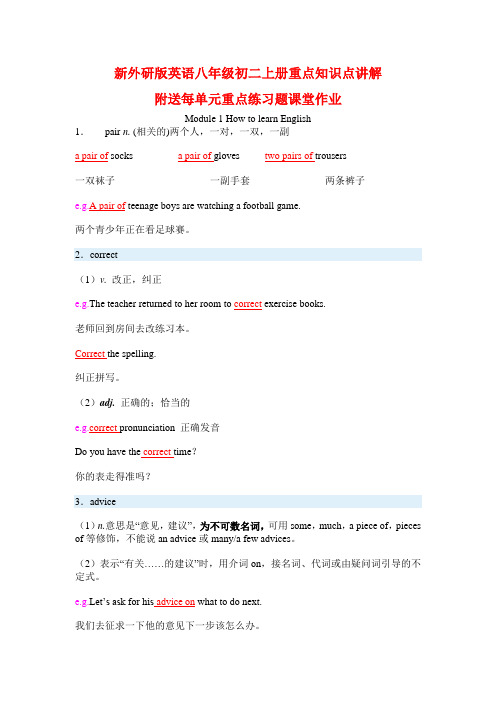
新外研版英语八年级初二上册重点知识点讲解附送每单元重点练习题课堂作业Module 1 How to learn English1.pair n. (相关的)两个人,一对,一双,一副a pair of socks a pair of gloves two pairs of trousers一双袜子一副手套两条裤子e.g.A pair of teenage boys are watching a football game.两个青少年正在看足球赛。
2.correct(1)v. 改正,纠正e.g.The teacher returned to her room to correct exercise books.老师回到房间去改练习本。
Correct the spelling.纠正拼写。
(2)adj.正确的;恰当的e.g.correct pronunciation 正确发音Do you have the correct time?你的表走得准吗?3.advice(1)n.意思是“意见,建议”,为不可数名词,可用some,much,a piece of,pieces of等修饰,不能说an advice或many/a few advices。
(2)表示“有关……的建议”时,用介词on,接名词、代词或由疑问词引导的不定式。
e.g.Let’s ask for his advice on what to do next.我们去征求一下他的意见下一步该怎么办。
常见搭配:take/follow one’s advice接受某人的建议ask for advice 征求意见accept/refuse one’s advice接受(拒绝)某人的建议offer advice to sb. 向某人提供建议拓展:advise vt.建议常见搭配:advise sb. to do sth.advise that sb. (should) do sth.e.g.My teacher advises me to leave now.老师建议我现在就离开。
Module1HowtolearnEnglish知识点语法讲解总结归纳外研版英语八年级上册
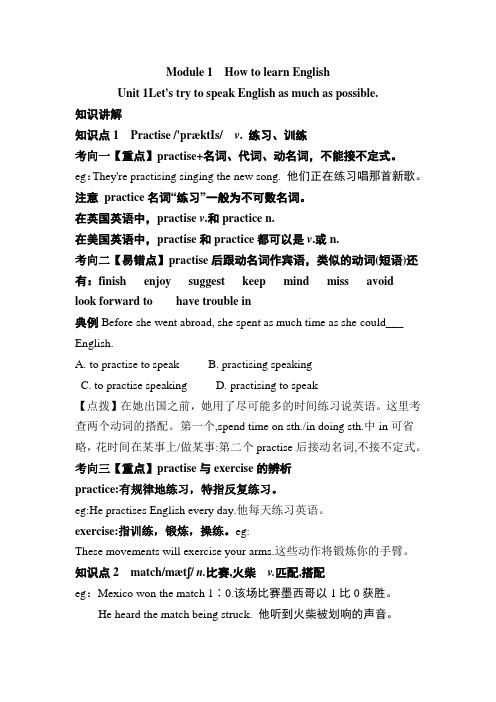
Module 1 How to learn EnglishUnit 1Let's try to speak English as much as possible.知识讲解知识点1 Practise /'præktIs/ v. 练习、训练考向一【重点】practise+名词、代词、动名词,不能接不定式。
eg:They're practising singing the new song. 他们正在练习唱那首新歌。
注意practice名词“练习”一般为不可数名词。
在英国英语中,practise v.和practice n.在美国英语中,practise和practice都可以是v.或n.考向二【易错点】practise后跟动名词作宾语,类似的动词(短语)还有:finish enjoy suggest keep mind miss avoidlook forward to have trouble in典例Before she went abroad, she spent as much time as she could___ English.A.to practise to speakB. practising speakingC. to practise speakingD. practising to speak【点拨】在她出国之前,她用了尽可能多的时间练习说英语。
这里考查两个动词的搭配。
第一个,spend time on sth./in doing sth.中in可省略,花时间在某事上/做某事:第二个practise后接动名词,不接不定式。
考向三【重点】practise与exercise的辨析practice:有规律地练习,特指反复练习。
eg:He practises English every day.他每天练习英语。
exercise:指训练,锻炼,操练。
初中八年级英语上册外研版Module 1 How to learn English 文化背景资料

学习英语的方法1.坚持不懈,从不间断。
每天至少看10-15 分钟的英语,早晨和晚上是学英语的最好时间。
(Never give up, keep working on. Speak English at least 10-15 minutes every day. The best time to learn English is in the morning and the evening.)2.方法要灵活多样。
一种方式学厌了,可以变换其他的方式,以便学而不厌。
(Different ways to learn English. One way is boring, you can use other ways, so that you won't feel bored.)3.上下相连,从不孤立。
记忆英语要结合上下文,不要孤立的记单词和短语,要把握句中的用法。
(Connect up to down, don't make it alone. According to the passage, remember the words and phrases, try to grasp the meanings of the words. ) 4.熟记常用语,确保准确无误。
把常用的交际用语背熟,俗能生巧。
(Remember useful expressions, and make sure it's right. Practice makes perfect.)5.尽量用第一人称来记习惯用语和句型,以便记忆牢固。
(Try to Remember idioms and sentences with the first calling, make sure to remember deeply.)6.多方位多角度来学英语。
要经常读报、听广播、看外语电影、听外语讲座、读课本和别人交谈等方式来学英语。
- 1、下载文档前请自行甄别文档内容的完整性,平台不提供额外的编辑、内容补充、找答案等附加服务。
- 2、"仅部分预览"的文档,不可在线预览部分如存在完整性等问题,可反馈申请退款(可完整预览的文档不适用该条件!)。
- 3、如文档侵犯您的权益,请联系客服反馈,我们会尽快为您处理(人工客服工作时间:9:00-18:30)。
八年级英语上Moduel1.How to learn English Unit 1 第二课时
预习
一英汉互译
1学习词汇
2听英语
3最好的建议
4make mistakes
5 a vocabulary notebook
6 grammar mistakes
二.用所给动词的适当形式填空
1Boys and girls.please write notes about ( translate)
2.Do you know is the best advice for (learn) vocabulary.
3.Does you friend often (send ) you email messages?
4.What should you do to improve your (read)?
5.Don’t forget (lock )the door when you leave the classroom.
课堂练习
一.单项填空
1.Our English teacher wrote many notes about English yesterday.
A.speak B .speaks C .to speak D.speaking
2.My father a newspaper at home every day.
A.look at
B.looks at
C.read
D.reads
3.What do you think is the advice for writing?
A.good
B.better
C.best
D.well
4.- did you see in the picture?
-Nothing.
A.What else
B.Who else
C.What other
D.Who other
5.I think your is better than the other students in our classs.
A.write
B.writes
C.to write Dwriting
6.Tom usually forgets his vocabulary notebook.
A.check
B.checks
C.to check
D.checking
7.Li Ming is amy good friend .He lrten helps me my English.
A.at
B.in
C.have ,has
D.has ,have
8.Tom a pen friend but he doesn’t a radio.
A.have,have
B.has ,has
C.have,has
D.has ,have
二.选择方框内合适的词填空。
’m going to give you some 1 .You can write it 2 .You should always speak English in 3 .And you should write down your mistakes in your notebooks ,And why don’t you write down the 4 spelling and grammar next to the mistakes? It’s a good 5 to check your vocabulary notebook every day .And you can lidten to the 6
or read a newspaper in English.But try not to 7 every word .If you have a pen friend ,you can write email messages to 8 other.
课后作业
将下列翻译成英语
1你认为学英语的最好建议是什么?(the best advice)
2.你经常犯什么样的错误?(make mistakes)
3你的笔友经常给你发电子邮件吗?(send email messages)
4我们应该做什么来改善我们的听力?(improve ,listen)
5.不要忘了每天核查你的词汇笔记。
(forget to do ssth.)
参考答案
预习一1.learn vocabulary 2.listen to English 3.the best advice 4犯错误5词汇笔记6语法错误
二.1.translation 2.learning 3.send 4.reading 5.to lock
课内练习
一1.D介词后的动词应加ing 即动名词形式。
2.D看报纸就用read
3C必须用最高级
4.A.other后面应跟名词,而else跟在代词后面,根据句意可排除who
5.D your为形容词性物主代词,后面须跟名词。
6.C forget后面跟不定式,意为忘记做某事
7C help sb.with sth.意为某人干某事
8D 本句为一般现在时,主语为第三人称单数,故其肯定句的否定句应找助动词does帮忙二.1.advice 2down 3.class 4correct 5idea 6.radio 7.translate 8.each
课后作业
1.What do you think is the best advice for learning English?
2.What mistakes do you often make?
3.Does your pen friend often send you email messages?
4.What should we do to improve our listening
5.Don’t forget to check your vocabulary notebook every day.。
